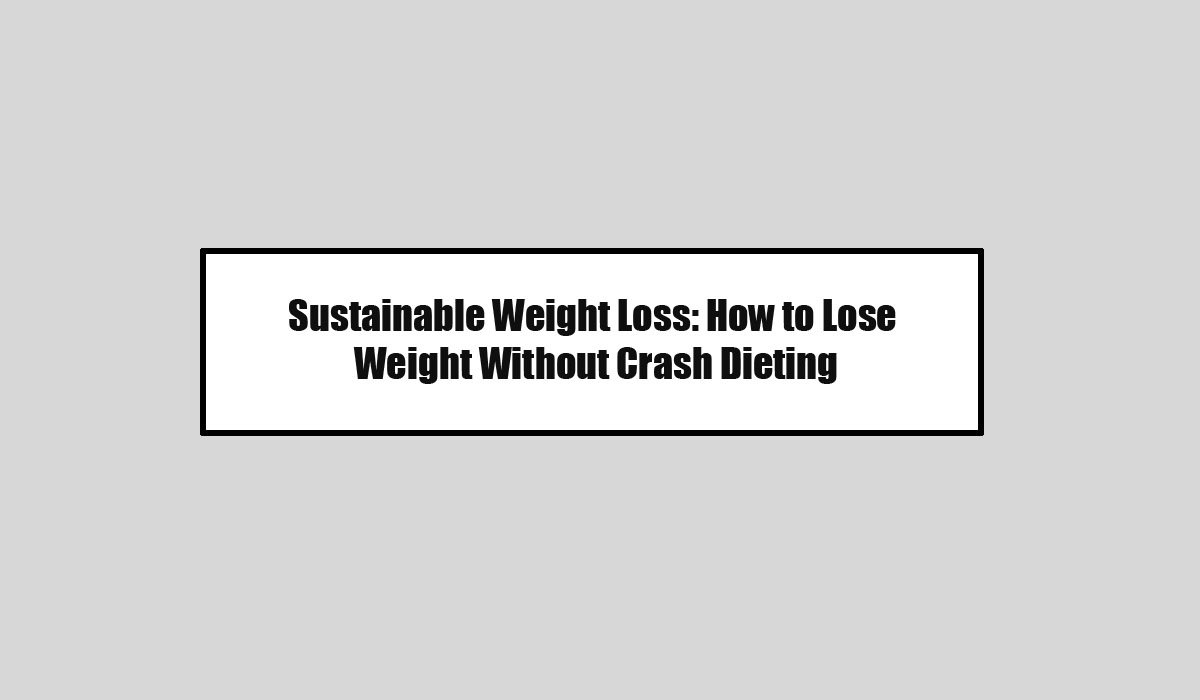Losing weight sustainably means making changes that are both effective and long-lasting. Crash diets promise rapid results, but they are often difficult to maintain and may harm your body in the long term. If you’re looking to shed pounds in a healthy way that sticks, focusing on sustainable habits is the key.
What is Sustainable Weight Loss?
Sustainable weight loss refers to gradually losing weight in a manner that you can maintain over time. It involves creating healthy habits that support fat loss while improving overall well-being. Unlike fad diets, which often eliminate food groups or severely restrict calories, sustainable weight loss embraces balance and consistency.
Why Crash Diets Don’t Work
Crash diets may seem tempting because they promise fast results. However, these diets often come with a host of problems:
- Nutrient Deficiency: Severely restricting calories or cutting out entire food groups can lead to a lack of essential nutrients.
- Loss of Muscle Mass: Rapid weight loss often results in muscle loss along with fat.
- Metabolism Damage: When you drastically reduce calories, your body adapts by slowing down your metabolism, making it harder to lose weight and easier to regain it.
- Short-term Results: Most people regain the weight they lose from crash diets because they’re not sustainable in the long run.
Instead of focusing on short-term gains, aim for long-term habits that contribute to lasting weight loss.
1. Start with a Balanced Diet
The foundation of sustainable weight loss is a well-balanced diet. Instead of eliminating entire food groups, focus on incorporating a wide variety of nutrient-dense foods:
- Protein: Helps maintain muscle mass and keeps you feeling full for longer. Include sources like lean meats, fish, eggs, legumes, and tofu.
- Healthy Fats: Avocados, nuts, seeds, and olive oil provide essential fatty acids that help your body function properly.
- Complex Carbohydrates: Whole grains, vegetables, and legumes provide long-lasting energy and fiber, helping you stay satisfied.
- Fruits and Vegetables: Packed with vitamins, minerals, and fiber, these foods should be a staple in your daily meals.
Aim for a balanced plate at every meal, including all macronutrients in appropriate proportions. This ensures your body gets everything it needs to function while keeping your hunger in check.
2. Prioritize Portion Control
You don’t need to eliminate your favorite foods to lose weight. Instead, practice portion control. Here are a few tips to help:
- Use Smaller Plates: Studies show that using smaller plates can help you eat less without feeling deprived.
- Be Mindful of Serving Sizes: Pay attention to food labels and serving sizes to avoid overeating.
- Listen to Your Body: Learn to recognize when you’re full. Eat slowly and stop when you’re satisfied, not stuffed.
By controlling portions, you can still enjoy the foods you love while maintaining a calorie deficit, leading to gradual and sustainable weight loss.
3. Practice Mindful Eating
Mindful eating encourages you to focus on your food and the act of eating. This can prevent overeating and help you make healthier food choices. Tips for practicing mindful eating include:
- Eat Without Distractions: Avoid eating in front of the TV or while scrolling through your phone.
- Savor Each Bite: Pay attention to the taste, texture, and aroma of your food.
- Eat Slowly: Taking your time allows your body to register fullness, reducing the likelihood of overeating.
4. Focus on Consistency Over Perfection
Perfectionism can derail your weight loss efforts. Instead of striving for perfect meals or workouts every day, focus on being consistent. Remember, it’s the cumulative effect of your daily habits that leads to results, not any single meal or workout. If you slip up, get back on track at your next meal rather than letting it snowball into a series of poor choices.
5. Incorporate Regular Exercise
Exercise is a crucial part of sustainable weight loss. It not only helps you burn calories but also boosts your metabolism, builds muscle, and improves your overall health. Here’s how to make exercise a sustainable habit:
- Find What You Enjoy: Choose exercises you like, whether it’s walking, swimming, cycling, or yoga. This makes it more likely you’ll stick with it.
- Mix Cardio and Strength Training: Cardio helps burn calories, while strength training builds muscle, which increases your metabolism.
- Set Realistic Goals: Start with small, achievable fitness goals, and gradually increase the intensity and duration of your workouts.
6. Prioritize Sleep and Stress Management
Many people overlook the importance of sleep and stress management when trying to lose weight. However, both play a vital role in sustainable weight loss:
- Sleep: Lack of sleep increases hunger hormones and decreases the hormone that makes you feel full. Aim for 7-9 hours of sleep per night.
- Stress: Chronic stress can lead to emotional eating and weight gain. Practice stress-relieving activities like meditation, deep breathing, or yoga.
7. Stay Hydrated
Drinking enough water throughout the day can support your weight loss efforts. It helps to control hunger and may even boost your metabolism slightly. Replace sugary drinks with water, herbal teas, or other low-calorie beverages.
8. Track Your Progress
Tracking your weight loss progress can keep you motivated and help you identify what’s working. Consider tracking:
- Food Intake: Use a food journal or app to monitor what and how much you eat.
- Workouts: Keep a record of your workouts, including duration and intensity.
- Non-Scale Victories: Notice other signs of progress, such as increased energy, better sleep, or improved fitness levels.
Conclusion
Sustainable weight loss doesn’t require extreme measures like crash diets. By focusing on long-term habits, such as eating a balanced diet, controlling portions, staying active, and managing stress, you can achieve and maintain a healthy weight for the long run. Remember, it’s about progress, not perfection—small, consistent changes lead to big results over time.

